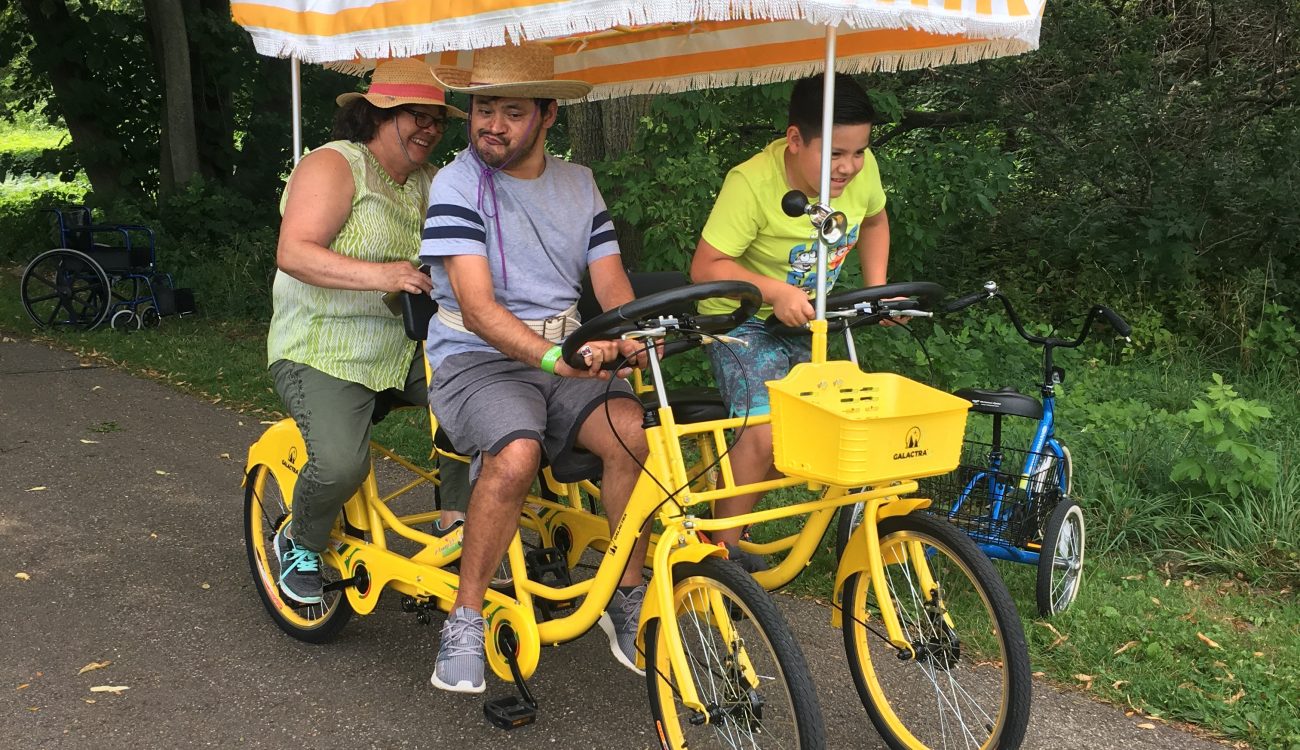
Adaptive Bikes
An Essential Tool for Equality in Cycling!
In our work with Safe Routes to Schools, the diversity of students and total number of students that we work with in a year is immense. Yet, there is one piece that we have been working on improving: creating alternatives for those students who do not meet the traditional mold of someone who rides a bike.
During the past year when schools were still closed and lessons were being taught virtually, our staff with Safe Routes worked extensively with the MPS site at Trowbridge School of Freshwater Studies in Bay View. Not only did we do virtual lessons with K-8th Grade classrooms but we initiated Monthly Walking Clubs with families and the community. In doing this, we fostered lasting relationships with staff and students which enabled an all day Bike Drivers Ed Class to happen with some of the 5th and 6th Grade students who were going to school In-Person. The staff consciously let us know right away that one of the students with special needs would not be able to participate due to problems with balance. However, we quickly reached out to the student’s teacher to let them know to include this student in our biking program. After talking with Wheel and Sprocket, we were able to borrow an Adaptive Recumbent Cycle and what came out of this experience was eye opening.
There were no expectations when the class started and with a little adjustment we had our student on the cycle and ready to show us what he could do. Within minutes he was able to ride, take sharp turns, break and even do the street course that we set-up. Remember, this was a student who never had success with a traditional two wheeler and hadn’t had the independence to ride on his own without help. By the end of class, my co-workers and I talked about how we wished we could have gifted this student the cycle yet it wasn’t ours and we didn’t want to get hopes up with no concrete plan. Within a week we had reached out to this student’s teacher who connected us with his family. After talking with them about their past frustrations and hopes for future family rides a GoFundMe was set up. I let the family know that we were not sure how long it would take, and could not guarantee anything but was hopeful the community would come through for them.
Fast forward a month and we had reached our goal and were able to purchase the same recumbent cycle from Wheel and Sprocket that we had originally used in the Bike Drivers Ed Class. His family came in to get the cycle adjusted and the smile on this young student’s face was infectious. In fact, while he was getting it adjusted to his size, he told his mom that he would meet her back at home! Once the bike was fit, we went outside and had him practice riding around. With little assistance he was able, once again, to ride with confidence and you could see how proud he was riding in front of his mother and little brothers.
While an adaptive cycle does not mean a younger student may ever be fully independent or able to ride on busy city streets it opens up opportunities that they so deserve to gain the independence that is necessary to build self confidence. It becomes one more tool to help them as they grow up and take on new responsibilities. So many students who are simply labeled as disabled are very capable of doing the same things as their peers as long as they are given the right tools to be able to be successful. Let’s work together to break down the barriers to cycling for all people regardless of our differences.
Bike Workshop @ Trowbridge School Of Freshwater Studies
Looking Forward
As we look forward to the next year of Safe Routes to School there are a lot of exciting plans being implemented. Not only are we working with Milwaukee Public Schools to build a fleet of Adaptive Cycles that can be modified for various disabilities and physical limitations but we are also creating new curriculum to make sure we are being as inclusive as possible for people across the full spectrum of disabilities. Along with the physical tools, It is important to realize the role that perceptions of who can ride a cycle greatly affect those people who do not fit the typical image that one might have of a cyclist. While for many people without disabilities, a bicycle is a form of exercise or something done on weekends for leisure, for many people with disabilities, a cycle is also a mobility aid essential to their independence and daily life. Currently we are partnering with the MPS to adapt our curriculum to serve Deaf & Hard of Hearing students at Milwaukee School of Sign Language and Neeskara Schools this year. This is an exciting addition to our work with youth as we begin to improve access for students of all abilities.